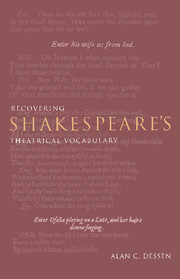Book contents
- Frontmatter
- Contents
- Preface
- Note on texts and old spelling
- 1 The problem, the evidence, and the language barrier
- 2 Lost in translation
- 3 Interpreting without a dictionary
- 4 Juxtapositions
- 5 Theatrical italics
- 6 Sick chairs and sick thrones
- 7 Much virtue in as
- 8 The vocabulary of “place”
- 9 “Romeo opens the tomb”
- 10 Vanish and vanishing
- Conclusion: So what?
- Notes
- Plays and editions cited
- Index
8 - The vocabulary of “place”
Published online by Cambridge University Press: 07 May 2010
- Frontmatter
- Contents
- Preface
- Note on texts and old spelling
- 1 The problem, the evidence, and the language barrier
- 2 Lost in translation
- 3 Interpreting without a dictionary
- 4 Juxtapositions
- 5 Theatrical italics
- 6 Sick chairs and sick thrones
- 7 Much virtue in as
- 8 The vocabulary of “place”
- 9 “Romeo opens the tomb”
- 10 Vanish and vanishing
- Conclusion: So what?
- Notes
- Plays and editions cited
- Index
Summary
“Enter Seldome and Grace working as in their shop”
Field, Amends for Ladies, 2.1.o.s.d.“Enter Geraldine as in his study reading”
Cooke, Greene's Tu Quoque, B4VTo concentrate upon the many stage directions that invoke a theatrical as [if] is to bring into focus some fruitful questions and problems. Among the most challenging is how “place” or locale was signaled in the original productions. For centuries, readers of Shakespeare's plays have conjured up images in the theatres of their minds of famous moments linked to specific places (so who knows not “the Balcony Scene” or “the Forum Scene”?). Few of those readers, however, are aware of how little evidence has survived about the presentation of such places at the Globe. Admittedly, Elizabethan dramatists and players often did call attention to distinctive locales as significant parts of their narratives, so that the extant manuscripts and printed texts regularly direct figures to enter in prison, in the shop, or in his study. To determine how such effects were actually implemented, however, is no easy matter. The varying formulations, moreover, can have significant implications for the interpretation of Shakespeare's plays.
Why is “place” such a problem for the historian or interpreter? One reason (as noted in chapter 7) is a product of the limited resources available in a “minimalist” theatre that lacked variable lighting, elaborate sets, and a fourth wall convention.
- Type
- Chapter
- Information
- Recovering Shakespeare's Theatrical Vocabulary , pp. 150 - 175Publisher: Cambridge University PressPrint publication year: 1995



